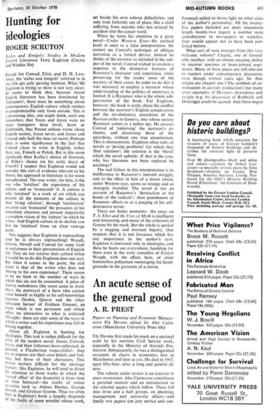Hunting for ideologies
ROGER SCRUTON
Exiles and Emigres: Studies in Modern English Literature Terry Eagleton (Chatto and Windus 36s)
Except for Conrad, Eliot, and D. H. Law, fence. the 'exiles and emigris' referred to in the title get only passing mention. What Mr Eagleton is trying to show is not very clear; he seems to think that, because recent English literature has been dominated by `foreigners', there must be something about contemporary English culture which renders it comprehensible only from outside. This is a promising idea, one might think, until one remembers that Yeats and Joyce were no more foreigners than Swift, Scott or Goldsmith, that Pound seldom wrote about English society, Joyce never, and James and Conrad only half the time (at most). Perhaps there is some significance in the fact that Conrad chose to write in English, rather than, say, French or Polish. But is this more significant than Kafka's choice of German, or Rilke's choice (in his early days) of French? I suspect that Eagleton would not consider this sort of evidence relevant to his theme; his approach to literature is far more metaphysical. The true writer, for him, is the one who lotalises' the experience of his culture, and so 'transcends' it. A culture is only lotalised' in a work of art which can present all the elements of the culture in their living relation'; through `totalisation' an artist can `transcend' the pressures of his immediate situation and present impartially a complete vision of the `culture' in which he writes. And English culture in its decline can best be lotalised9 from an alien vantage point.
This suggests that Eagleton is reproaching (and he is, always reproaching) Waugh, Greene, Orwell and Conrad for some fault or unfairness in their presentation of English life. They do not totalise their culture (what it would be to do this Eagleton does not say). But when it comes to the point, the real crime is that of the writer who does not 'belong to his own experience'. There seems to be no limit to the number of ways in which this sin can be committed. A piece of clumsy melodrama (the street scene in Antic Hay), the portrayal of a hero who cannot value himself as highly as his self-knowledge requires (Scobie, Querry and the other `reluctant heroes' of Graham Greene), an irony which is too persistent and which offers no alternative to what is criticised (Waugh): these are only some of the ways in which a writer and his experience may fail to belong together.
Above all, Eagleton is hunting for Ideologies. This task is rather difficult for the critic of the modern novel. James, Conrad, Joyce, and their followers have cultivated, in general, a Flaubertian impassibilite: they try to express not their own beliefs and feel- ings, but those of their characters. This makes matters difficult for the ideology hunter: like Eagleton, he will tend to direct his attention to those works in which the `sacred office' of the dramatist is from time to time betrayed—the works of minor novelists such as Aldous Huxley, George Orwell, and Graham Greene. Thus we often find in Eagleton's book a lengthy diagnosis of the faults of some novelist whose work,
set beside his own solemn didacticism, can only look forlornly out of place, like a child suffering from measles who has strayed by accident into the cancer ward.
When he turns his attention to a great novel—Under Western Eyes—his method leads at once to a false interpretation. He cannot see Conrad's technique of oblique narration as a formal device; instead he thinks of the narrator as included in the sub- ject of the novel. Conrad wished to awaken a response to the distinctive features of Razumov's character and experience, while preserving for the reader some of the mystery of their cause. In order to do this it was necessary to employ a narrator whose understanding of the politics of autocracy is limited. It is Razumov who is the whole sub- ject-matter of the book. For Eagleton, however, the book is really about the conflict between the narrator's English conservatism and the revolutionary anarchism of the Russian exiles in Geneva, into whose society Razumov comes as a police spy. He accuses Conrad of 'endorsing' the narrator's at- titudes, and dismissing those of the anarchists, without any true examination. This is characteristic. Eagleton often talks of novels as 'posing problems' for which they `find solutions% the solution is the 'thesis' which the novel upholds. If that is the case, why has literature not been replaced by sociology?
The real failure in this interpretation is its indifference to Razumov's internal struggle, and to the effect in him of a terror which, under Western eyes, seems so strange and so strangely founded. The novel is not an account of Razumov's 'destruction at the hands of the radicals': their punishment of Razumov affects us as a purging of his self- destructive terror.
There are better moments: the essay on T. S. Eliot and the Uses of Myth is intelligent and interesting, and many of the criticisms of Greene hit the mark. But the whole is spoiled by a nagging and insistent bigotry. One suspects that it is not literature which has any importance in the author's eyes. Eagleton is interested only in ideologies, and these he hunts out everywhere, fumbling for them even in the early comedies of Evelyn Waugh, with the effect, here, of some humourless policeman rummaging for hand- grenades in the garments of a clown.














































 Previous page
Previous page